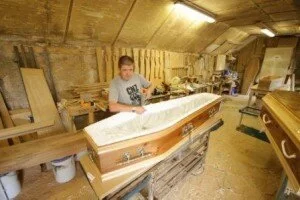
Coffin-making is big business with over 600 000 funerals annually.
Death, it is often said, is big business.
About 600 000 funerals take place in South Africa per year, generating about R9 billion in funeral-related expenditure.
However, it is difficult to get accurate figures about this sector, because many businesses are informal. Most of these businesses are not registered with any industry association, and stories of unsavoury activities abound – from identity theft to unsanitary working conditions.
But, there are plenty of good opportunities for compliant and respectful service providers to succeed; be they large players, franchises or independent operators. Take coffin-making, for instance. This is a skilled trade that can be practiced in line with high standards and varied customer preferences.
Although many people today choose cremation as the last step in their worldly journey, formal burial in a wooden coffin remains the more common choice in South Africa. Customers look for a range of sizes and prices, so coffin-makers need to be both competent and versatile.
The essential skill involved is woodworking, which needs to be combined with a good understanding of pricing, suitability and product standards. There are also very specific product requirements to consider. For instance, a burial box for a cremation funeral is different to one for a grave burial.
Generally, caskets with flat lids or even raised lids will be affordable to middle class clients, while a more elaborate dome casket design will be for those families with more money to spend. Better quality wood and trimmings are also used in the more upmarket designs, which raises the price.
While there are standards that coffin-makers can adhere to in designing and manufacturing their products, these are not compulsory. The South African Bureau of Standards (SABS) publishes standards for coffins and caskets, specifying the materials that should be used so that the product serves its purpose properly. The leakage of bodily fluids from a coffin is one of the main risks to prevent.
Historically, there was a time when apprentices found their way into this line of work when they started their woodworking careers. Over time, they would become skilled craftsmen specialising in burial boxes. These days, there are quicker routes into the business, including training programmes that you can complete in a week, followed by some ongoing advice and other resources.
For any entrepreneur doing this kind of enterprise, it is critical to develop an efficient manufacturing process. This means having a jig (a frame for holding your work and guiding the tools you use) and the right templates to make each piece of the casket.
Training companies that advertise coffin-making courses also help with advice on the jigs and templates.
Check out the credentials of any training agency before you part with your hard-earned cash!

Paul Crankshaw
- Paul Crankshaw is an entrepreneur and mentor specialising in print media. He is also the director of Cobweb Information SA. Go to www.cobwebinfo.co.za for more information.
